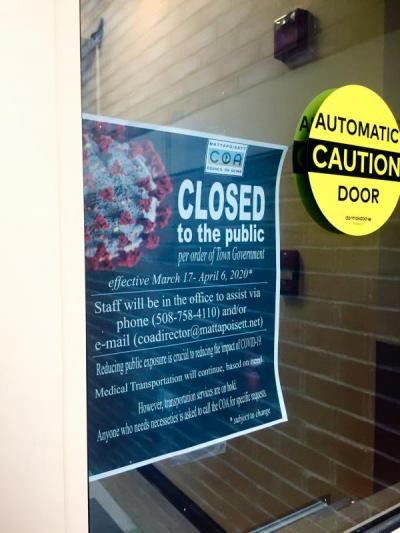Senior centers adapt to shifting roles amid coronavirus shutdown
With all three Tri-Town senior centers remain closed to events and meals in the midst of the new coronavirus, organizers have turned to distributing meals, reaching out by phone and organizing other logistics.
Marion has focused heavily on making sure seniors that depend on the town senior center for food won’t go hungry.
“We remain very busy at the Community Center, just focused in a very different direction,” said Director Karen Gregory.
Early in the week she worked to get food supplies to the senior center and tell seniors about them.
“We are delivering the Meals on Wheels. In addition, we are still providing transportation for necessary medical needs like dialysis or cancer treatments. For those who cannot make it to the Center to pick up groceries we are providing home deliveries,” Gregory said.
After making sure seniors have enough food, Gregory plans to reach out on other needs.
“We are also in the planning stages of how to begin a phone check in with our senior population,” she said.
For Mattapoisett Senior Center Director Jackie Coucci, reaching out to residents was a first on her list.
“Our main priorities this week have been connecting with residents by phone,” she wrote. “We did an ‘all call’ to over 800 people in our phone network, letting people know that they can contact us and recommending that they consider stretching their food resources by registering for Meals On Wheels deliveries during this quarantined period.”
She clarified that because everyone over the age of 60 is supposed to stay home, seniors are all eligible for Meals on Wheels.
While some calls have been to give out information, others have been personal and more of a check in.
“Our outreach coordinators, Elizabeth Leatham and Corinne Marlow, have been calling people the past couple of days to ask how people have been during this week, if they have support, and what are their thoughts at this time. From the calls made, the primary concern shared was the uncertainty of how long ‘this’ will last,” Coucci said.
The question on the coronavirus timeline is one that Coucci herself has also considered.
“As challenging as these times are now, this first week is not the biggest concern. I am more concerned for anything after week two or three, or more,” she said.
The senior center is also working to prepare a “friendly callers” program for seniors who might not have anyone to call.
Other tasks include providing rides to medical appointments, working on the newsletter, (which Coucci called “very challenging, given we don’t know when to reschedule anything,”), maintaining certifications, updating systems, organizing and brainstorming for the future.
The Rochester Senior Center has taken on a mix of those two activities.
Staff are arranging and providing van transportation services, lending medical equipment (except for wheelchairs, because the senior center is out) and delivering meals.
Senior Center volunteers are available to shop for homebound seniors and are preparing homemade meals to deliver.If seniors provide grocery lists, shoppers will purchase the items and deliver them to their recipients.
Coucci emphasized the importance of connection at this time.
“This is the time to let people know you are thinking of them and to share concerns; share memories; share stories; anything so that people have a connection with others,” she said. “Socialization is so important, especially when many are feeling anxiety and uncertainty. With technology, even a simple home phone, allows for people to make a connection with someone.













